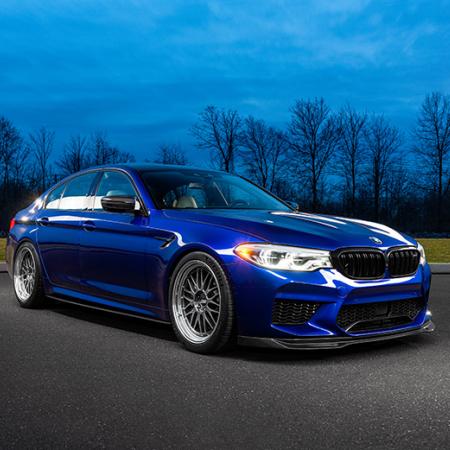If BMW's latest technology has you torn between traditional high performance and the electronic advancements that make driving safer, more comfortable, and more connected, prepare to be torn some more. BMW M, the company's last bastion of internal-combustion power, fine-tuned suspensions, and huge brakes, will eventually build electrified M cars.
The question is not if, but when. As Frank van Meel, head of BMW M, told Auto Express at the North American International Auto Show in January, “It will happen, but the question is when is that going to happen. Currently we still have a power-to-weight issue with electrification which makes that difficult to fit into a motorsports philosophy.”
Well that's a relief. Full-on, total electric M5s are still some years away. In the meantime, we may have to deal with plug-in hybrid versions of the M5—and M2, M3, and M4. For purists, that's a bad thing, right?
If weight is the enemy of performance, then yes, adding electric motors and huge high-voltage batteries and charging systems could be bad for M cars' bottom line; and for an M car, we believe the bottom line is not so much cost as it is speed and handling. But if there were a way to mitigate the additional heaviness by using weight-saving materials to keep the total mass down, might the additional electric horsepower and especially the smooth and immediate torque added by an electric motor help with performance?
That seems to be what van Meel is thinking, as he explained that M car hybrid systems would be geared not so much for efficiency as for performance. Not that efficiency would be ignored, however. For example, van Meel said that Start/Stop is coming to M vehicles. Great. Start/Stop is fine as long as we can turn it off if we think it's annoying or too hard on the starter.
If your M car went from zero to 60 mph in three seconds, would you care that it did so with the help of an electric motor and oh, by the way, instead of 17 miles per gallon you got 25? Would blindingly fast acceleration coming out of a corner not be worth it, especially in a car with zero point-of-use emissions?
The BMW i8 is not an M car and according to van Meel, never will be. But the performance the i8 gets from a three-cylinder internal combustion engine combined with a two-speed electric motor is impressive, M car or not.
Van Meel says, "M is about uncompromised motorsport," which begs the question, is using electricity a compromise? For many traditionalist M car fans, BMW M jumped the shark when M engines became turbocharged. The next M5 will have all-wheel drive to handle the torque from a 600-plus horsepower engine. Will a plug-in hybrid M car that accelerates, stops, and handles better than any other BMW not be attractive? We will probably get a chance to find out in the not-too-distant future.—Scott Blazey
[Photos courtesy of BMW AG.]









